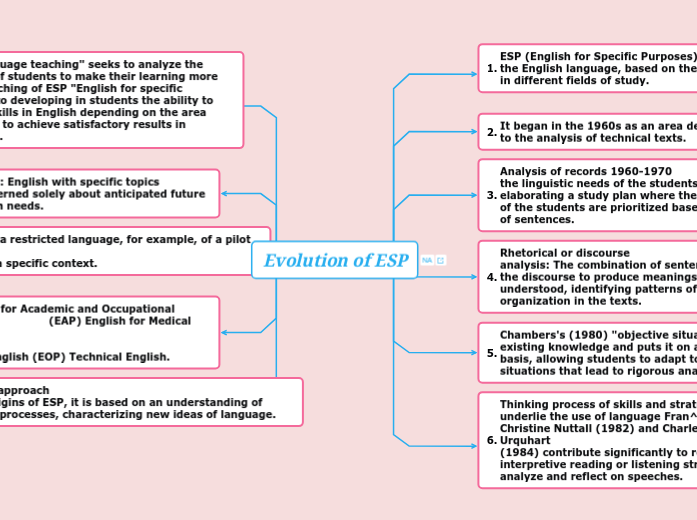Evolution of ESP
1.
ESP (English for Specific Purposes) It is an approach to teaching the English language, based on the linguistic needs of students in different fields of study.
2.
It began in the 1960s as an area dedicated to the analysis of technical texts.
3.Analysis of records 1960-1970
Analysis of records 1960-1970
the linguistic needs of the students are analyzed, elaborating a study plan where the forms of language of the students are prioritized based on the grammar of sentences.
4.Rhetorical or discourse
Rhetorical or discourse
analysis: The combination of sentences in the discourse to produce meanings is understood, identifying patterns of organization in the texts.
the results of this research (discourses of specific academic texts) allowed us to observe the generalized discourse (Widdowson, 1978).
5.
Chambers's (1980) "objective situation analysis" takes existing knowledge and puts it on a more scientific basis, allowing students to adapt to objective situations that lead to rigorous analysis.
6.Thinking process of skills and strategies that
Thinking process of skills and strategies that
underlie the use of language Fran^oise Grellet (1981),
Christine Nuttall (1982) and Charles Alderson and Sandy Urquhart
(1984) contribute significantly to reading skills and focus on interpretive reading or listening strategies, where students analyze and reflect on speeches.
11.
ELT "English language teaching" seeks to analyze the linguistic needs of students to make their learning more effective, the teaching of ESP "English for specific purposes" leads to developing in students the ability to elucubrate and skills in English depending on the area professional field to achieve satisfactory results in learning English. .
10.Type 3: English with specific topics
Type 3: English with specific topics
. Concerned solely about anticipated future English needs.
9.Type 2: English as a restricted language, for example, of a pilot or a waiter
Type 2: English as a restricted language, for example, of a pilot or a waiter
it is only used for a specific context.
8.Type 1: English for Academic and Occupational Purposes (EAP) English for Medical Studies.
Type 1: English for Academic and Occupational Purposes (EAP) English for Medical Studies.
Occupational English (EOP) Technical English.
7.learning centered approach
